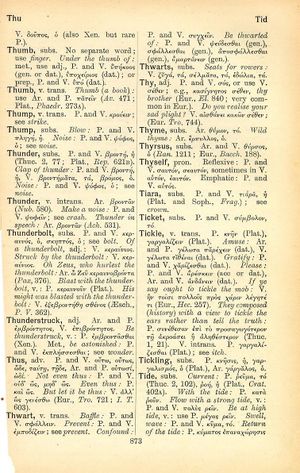thyrsus
ἢ τοὺς πότους ἐρεῖς δῆλον ὅτι καὶ τὰ δεῖπνα καὶ ἐσθῆτα καὶ ἀφροδίσια, καὶ δέδιας μὴ τούτων ἐνδεὴς γενόμενος ἀπόλωμαι. οὐκ ἐννοεῖς δὲ ὅτι τὸ μὴ διψῆν τοῦ πιεῖν πολὺ κάλλιον καὶ τὸ μὴ πεινῆν τοῦ φαγεῖν καὶ τὸ μὴ ῥιγοῦν τοῦ ἀμπεχόνης εὐπορεῖν; → There you'll go, talking of drinking and dining and dressing up and screwing, worrying I'll be lost without all that. Don't you realize how much better it is to have no thirst, than to drink? to have no hunger, than to eat? to not be cold, than to possess a wardrobe of finery? (Lucian, On Mourning 16)
English > Greek (Woodhouse)
subs.
Ar. and V. θύρσος, ὁ (Ran. 1211; Eur., Bacch. 188).
Latin > English (Lewis & Short)
thyrsus: i, m., = θύρσος,>
I a stalk, stem of a plant.
I Lit., Plin. 19, 8, 39, § 129; 25, 8, 41, § 81; 26, 8, 33, § 51; Suet. Aug. 77; Col. 10, 370.—
II Transf.
A A staff twined round with ivy and vine-shoots, borne by Bacchus and the Bacchantes; the Bacchic staff, thyrsus, Hor. C. 2, 19, 8; Ov. M. 3, 542; 3, 712; 4, 7; 9, 641; 11, 28; Stat. Th. 9, 614; Sen. Herc. Fur. 904; id. Oedip. 628 al. — Hence, poet. transf.,
B A thorn, goad: acri Percussit thyrso laudis spes magna meum cor, Lucr. 1, 923; Ov. Tr. 4, 1, 43.
Latin > French (Gaffiot 2016)
thyrsus,¹¹ ī, m. (θύρσος),
1 tige des plantes : Plin. 19, 129 ; Col. Rust. 10, 370
2 thyrse [bâton couronné de feuilles de lierre ou de vigne, attribut de Bacchus: Hor. O. 2, 19, 8 ; Ov. M. 3, 542 ; Stat. Th. 9, 614.
Latin > German (Georges)
thyrsus, ī, m. (θύρσος), I) jeder Stengel eines Gewächses, der Strunk, Colum., Plin. u.a.: boleti, Hut, Apic.: lactuculae, Suet.: vulg. tirsus geschr., zB. tirsus lactucae, Apic. 4, 123. – II) der mit Efeu und Weinranken umwundene Stab, den Bacchus und die Bacchantinnen (Bacchae) schwärmend in der Hand trugen, der Thyrsus, Bacchusstab, Catull., Hor. u.a.

